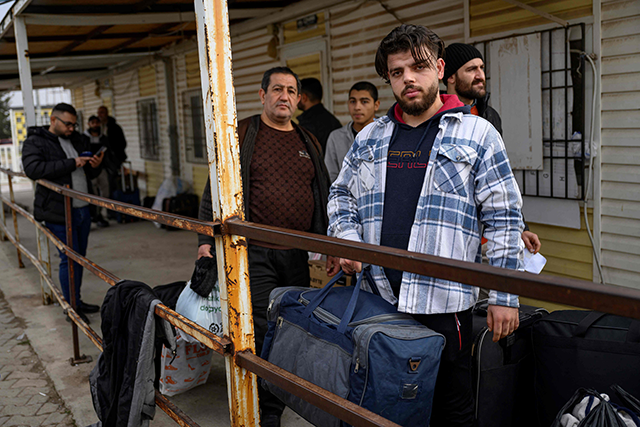ONCUPINAR, Turkey — After eight years in exile, Ibrahim Abdullah is finally going home, his belongings stuffed into the same simple sports bag he carried when he fled Syria as a young teen.
Just 13 at the time, Abdullah sneaked through the barbed wire along Syria's northern frontier to seek safety in neighbouring Turkey.
With the downfall of Bashar Al Assad, Abdullah is among thousands of Syrians going back. Bag in hand, he aims to find his childhood home in Aleppo, just days after an Islamist-led rebel offensive took the city and forced Assad to flee.
"There's nothing valuable in it, just a few clothes," he told AFP pointing to his bag while waiting at the Oncupinar border crossing near the Turkish city of Gaziantep.
Dressed in a blue-and-white checked shirt over a black hoodie, he arrived on a night bus from Istanbul which is home to around 500,000 of the three million Syrian refugees in Turkey.
"It took 18 hours, then 10 minutes by taxi to get here," he explained, standing between two refugee families also heading back to Syria.
Once across the border, the young man with floppy black hair and shaved temples will need at least another hour to reach Aleppo to the south.
"My family has a home there. It's destroyed but I'm going to try and rebuild it," he said calmly, a mobile phone in his hand.
His mother and four younger siblings have stayed in Istanbul where they live in Esenyurt, a district with a large Syrian community.
"They will follow me in two or three months, but I'm not coming back," he said in accentless Turkish.
Fleeing the bombardments
Between watching TikTok videos, he made calls to ensure a car will be waiting for him on the Syrian side of the border.
In the distance, a plume of black smoke curled into the air.
Nobody knew the cause of the smoke but Abdullah did not seem bothered, confident that the guns have fallen silent.
He did not recall much about crossing the border eight years ago. It was the height of the Syrian migration crisis when millions fled the intensive bombardment of Aleppo by government forces and their Russian allies.
"But I know we left on foot and I was carrying this bag," he said.
Since then he has been making shoes in an Istanbul factory and has not been to school.
His Istanbul memories would be of working-class neighbourhoods of the city, without once mentioning tourist highlights such as the Hagia Sophia, the Bosphorus or the Galata Tower.
In front of him, a metal gate leading to the final checkpoint before entering Syria briefly opened before quickly shutting again. Almost there but not quite.
Sitting on his bag, he fiddled with his Turkish residency card which has a white sticker with the number 157 on it. He was given the number on arrival at the border and it will be fed into the interior ministry's database.
Will he keep hold of the card as a memory of his time in Turkey?
"No, I'll have to give it back," he said.
"After that, it's over."
